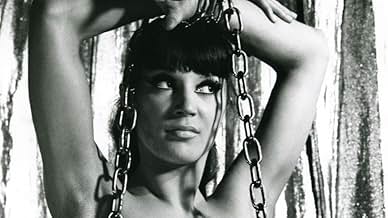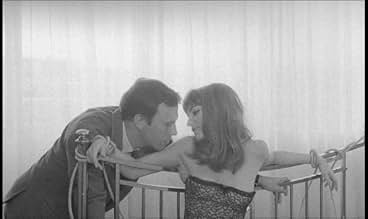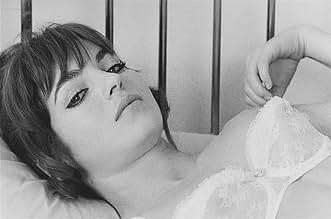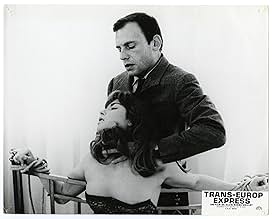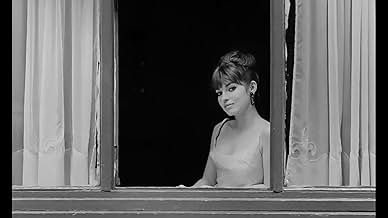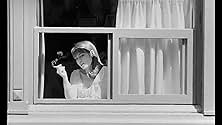Trans-Europ-Express
- 1966
- 1 घं 45 मि
IMDb रेटिंग
7.0/10
2.2 हज़ार
आपकी रेटिंग
अपनी भाषा में प्लॉट जोड़ेंA director, producer and assistant take the Trans-Europ-Express from Paris to Antwerp, where they brainstorm ideas for a film about a greenhorn drug smuggler and a kinky prostitute.A director, producer and assistant take the Trans-Europ-Express from Paris to Antwerp, where they brainstorm ideas for a film about a greenhorn drug smuggler and a kinky prostitute.A director, producer and assistant take the Trans-Europ-Express from Paris to Antwerp, where they brainstorm ideas for a film about a greenhorn drug smuggler and a kinky prostitute.
- निर्देशक
- लेखक
- स्टार
Gérard Palaprat
- Le Petit Mathieu
- (as Gerard Palaprat)
Clotilde Vanesco
- Cabaret Singer
- (as Clo Vanesco)
Jérôme Lindon
- Train traveller
- (बिना क्रेडिट के)
फ़ीचर्ड समीक्षाएं
Given that TRANS-EUROP-EXPRESS is the only movie directed by Alain Robbe-Grillet which the late conservative British film critic Leslie Halliwell reviewed in his celebrated “Film Guide”, one would think that it was more accessible than his usual reportedly impenetrable stuff and, in a way, it is – but still, the end result is hardly straightforward and almost as cerebral!
Jean-Louis Trintignant, in the first of four films he made with Robbe-Grillet, plays a novice drug courier tested by his future employers in carrying a stash of cocaine (which is actually sugar) by train and depositing it into a train station locker – but this simple task is fraught with any number of unexpected complications including police interrogation and night-time chases. Marie-France Pisier is a very beguiling presence here as a whore/double agent with whom Trintignant has several S&M encounters in a hotel room until her ‘double face’ drives him to murder…or does it? Although I was aware that the actress had played Colette in Francois Truffaut’s Antoine Doinel series and had the leading role in the trashy THE OTHER SIDE OF MIDNIGHT (1977), looking at her filmography just now I was surprised to learn that she was also in one of my favorite films, Luis Bunuel’s THE PHANTOM OF LIBERTY (1974), as well as Jacques Rivette’s ambitious fantasy CELINE AND JULIE GO BOATING (1974; which I’ve just acquired via the BFI’s 2-Disc edition)!
What this film has that the other Robbe-Grillet titles I’ve watched (including THE IMMORTAL ONE [1963]) don’t, is a surprisingly substantial dose of humor: in fact, the writer-director himself appears as a train passenger who is contemplating a film about drug-trafficking which (given that he happens to be on the train himself) would be an ideal vehicle for Jean-Louis Trintignant!; similarly, when Trintignant and Pisier go to a café he tells her that the waiter who had just served them was not a waiter at all but an actor playing a waiter!; during one of the various meetings with his shady employers, Trintignant is asked to repeat where he is supposed to meet his contact – implying a very complicated route – he simply replies “Where” (at which his employer doesn’t even bat an eyelid!), etc. At one point, Robbe-Grillet’s fellow passengers complain that drug-trafficking is no longer hip and that diamond-smuggling is the current criminal fad; therefore, Trintignant & Co. exchange costumes and settings accordingly…before the director decides to stick to his original idea (whim?) after all! Incidentally, this ‘screenplay-in-the-making’ structure reminds one of the contemporaneous Hollywood comedy, Paris WHEN IT SIZZLES (1964), which was itself a remake of an earlier French original – Julien Duvivier’s LA FETE A' HENRIETTE (1952). In fact, the whole self-referential element in the film and its heady spoof on the thriller genre recalls the Jean-Luc Godard of BREATHLESS (1960), BAND OF OUTSIDERS (1964), ALPHAVILLE (1965) and PIERROT LE FOU (1965) more than anything else...
Unfortunately, what I said about the poor video quality of EDEN AND AFTER (1970) applies to an even greater extent here – since this one looked distinctly like a tenth-generation dupe (with actors’ features being quite blurred at times and especially, alas, during the S&M striptease act towards the end). That said, the film itself is let down somewhat by sluggish pacing – even if the version I watched ran for a mere 88 minutes, when all sources I know of give its running-time as 105! As it is, I’d welcome a legitimate DVD release of TRANS-EUROP-EXPRESS and one hopes that the recent passing of its creator will inspire adventurous labels to pursue its rights.
Jean-Louis Trintignant, in the first of four films he made with Robbe-Grillet, plays a novice drug courier tested by his future employers in carrying a stash of cocaine (which is actually sugar) by train and depositing it into a train station locker – but this simple task is fraught with any number of unexpected complications including police interrogation and night-time chases. Marie-France Pisier is a very beguiling presence here as a whore/double agent with whom Trintignant has several S&M encounters in a hotel room until her ‘double face’ drives him to murder…or does it? Although I was aware that the actress had played Colette in Francois Truffaut’s Antoine Doinel series and had the leading role in the trashy THE OTHER SIDE OF MIDNIGHT (1977), looking at her filmography just now I was surprised to learn that she was also in one of my favorite films, Luis Bunuel’s THE PHANTOM OF LIBERTY (1974), as well as Jacques Rivette’s ambitious fantasy CELINE AND JULIE GO BOATING (1974; which I’ve just acquired via the BFI’s 2-Disc edition)!
What this film has that the other Robbe-Grillet titles I’ve watched (including THE IMMORTAL ONE [1963]) don’t, is a surprisingly substantial dose of humor: in fact, the writer-director himself appears as a train passenger who is contemplating a film about drug-trafficking which (given that he happens to be on the train himself) would be an ideal vehicle for Jean-Louis Trintignant!; similarly, when Trintignant and Pisier go to a café he tells her that the waiter who had just served them was not a waiter at all but an actor playing a waiter!; during one of the various meetings with his shady employers, Trintignant is asked to repeat where he is supposed to meet his contact – implying a very complicated route – he simply replies “Where” (at which his employer doesn’t even bat an eyelid!), etc. At one point, Robbe-Grillet’s fellow passengers complain that drug-trafficking is no longer hip and that diamond-smuggling is the current criminal fad; therefore, Trintignant & Co. exchange costumes and settings accordingly…before the director decides to stick to his original idea (whim?) after all! Incidentally, this ‘screenplay-in-the-making’ structure reminds one of the contemporaneous Hollywood comedy, Paris WHEN IT SIZZLES (1964), which was itself a remake of an earlier French original – Julien Duvivier’s LA FETE A' HENRIETTE (1952). In fact, the whole self-referential element in the film and its heady spoof on the thriller genre recalls the Jean-Luc Godard of BREATHLESS (1960), BAND OF OUTSIDERS (1964), ALPHAVILLE (1965) and PIERROT LE FOU (1965) more than anything else...
Unfortunately, what I said about the poor video quality of EDEN AND AFTER (1970) applies to an even greater extent here – since this one looked distinctly like a tenth-generation dupe (with actors’ features being quite blurred at times and especially, alas, during the S&M striptease act towards the end). That said, the film itself is let down somewhat by sluggish pacing – even if the version I watched ran for a mere 88 minutes, when all sources I know of give its running-time as 105! As it is, I’d welcome a legitimate DVD release of TRANS-EUROP-EXPRESS and one hopes that the recent passing of its creator will inspire adventurous labels to pursue its rights.
I would like to see someone produce a spoiler on this garbage (and, incidentally, probably all that robbe-grillet filmed - i just picked this one as a representative of all). This is BS-artistry pure. Unfortunately there is Money in art and in film, if you can get away with it. You need some Beautiful women to take there cloths off, of course, and a good cinematographer helps a lot as well. The Pictures are well lit and what you see of the women isn't bad - but that's it. No original thought here, in fact no thought whatsoever. That's why BS-artists are BS-artists - they basically have nothing to say about anything. There heads are a black hole from which nothing of value can escape. Robbe-Grillet and others of his ilk give film a bad name. Trintignant could be good - he proved that in other films. Here, however, he was taken in by a con-man, which is the essence of a BS-artist.
As a big fan of Jean-Louis Trintignant, I couldn't really pass this up. Alain Robbe-Grillet is always bound to do something meta, so this could only be some sort of film about film, and it is. There is also a story, but the point seems to be to talk about the construction of stories. Definitely worth watching once.
On board the TEE is 'Elias' (Jean-Louis Trintignant), a paranoid drug dealer on his way from Paris to Antwerp. And in another compartment are his creators; film-makers having a script meeting from which Elias emerges. It's a typical Robbe-Grillet construct, honed from nouveau roman experiments. The purpose of which, as he puts it, is to "assist change by throwing out any techniques which try to impose order or a particular interpretation on events". The result in this case is a parallel universe, on one hand Elias trying to act like a drug dealer and on the other, proceeding according to the whims of his creators. In effect, it becomes a real-time replay of the writing and editing process,
There are those who might regard this as typical French pretension, full of intellectual conceit (it was banned in England for many years), but it's playful, witty and very accessible thanks to a droll script and the great Jean-Louis. And then there's the beautiful Marie-France Pisier with her large inquisitive eyes. She makes an unlikely hooker, but is she? The scriptwriter on the train is played by Robbe-Grillet himself and so establishing that he really is making it up as he goes along. It's beautifully shot in crisp b&w, perfectly capturing the zeitgeist. It would be another twelve years before Kraftwerk created their musical homage to the great train, but it says something about both forms that it would have made the perfect soundtrack.
There are those who might regard this as typical French pretension, full of intellectual conceit (it was banned in England for many years), but it's playful, witty and very accessible thanks to a droll script and the great Jean-Louis. And then there's the beautiful Marie-France Pisier with her large inquisitive eyes. She makes an unlikely hooker, but is she? The scriptwriter on the train is played by Robbe-Grillet himself and so establishing that he really is making it up as he goes along. It's beautifully shot in crisp b&w, perfectly capturing the zeitgeist. It would be another twelve years before Kraftwerk created their musical homage to the great train, but it says something about both forms that it would have made the perfect soundtrack.
Director Alain Robbe-Grillet certainly polarises opinion. Everything from 'genius' to 'BS-artist'! Many reviews I have read are just as pretentious as his films are accused of being.
As a leading figure of the 'Nouveau Roman' school it was a natural progression to the medium of film where he could portray the 'natural disorder of things' and reach a far wider audience.
His unconventional structure suits this film perfectly as the director, playing himself, is literally making it up as he goes along whilst sitting on a train.
In this he also has the services of two charismatic leads, Jean-Louis Trintignant and Marie -France Pisier plus Willy Kurant's splendid camera work.
Many found the erotic images discomforting and although the bondage scenes in this are more M&S than S&M they were considered shocking enough in the mid-1960's to keep the film off British screens for quite a few years.
Robbe-Grillet's film is easily his most accessible and works wonderfully as Film Noir spoof. It is great fun and should not be taken too seriously.
क्या आपको पता है
- ट्रिवियाThis film was banned for a time by the British Censor because of its depiction of sexual bondage (which is now regarded as very tame). However, the ban was lifted at around the end of the 1960s.
- कनेक्शनReferences From Russia with Love (1963)
- साउंडट्रैकLa Traviata
टॉप पसंद
रेटिंग देने के लिए साइन-इन करें और वैयक्तिकृत सुझावों के लिए वॉचलिस्ट करें
- How long is Trans-Europ-Express?Alexa द्वारा संचालित
विवरण
- रिलीज़ की तारीख़
- कंट्री ऑफ़ ओरिजिन
- भाषाएं
- इस रूप में भी जाना जाता है
- Транс'європейський експрес
- फ़िल्माने की जगहें
- Central Station, Antwerp, Flanders, बेल्जियम(railway station)
- उत्पादन कंपनियां
- IMDbPro पर और कंपनी क्रेडिट देखें
- चलने की अवधि1 घंटा 45 मिनट
- रंग
- ध्वनि मिश्रण
- पक्ष अनुपात
- 1.66 : 1
इस पेज में योगदान दें
किसी बदलाव का सुझाव दें या अनुपलब्ध कॉन्टेंट जोड़ें


